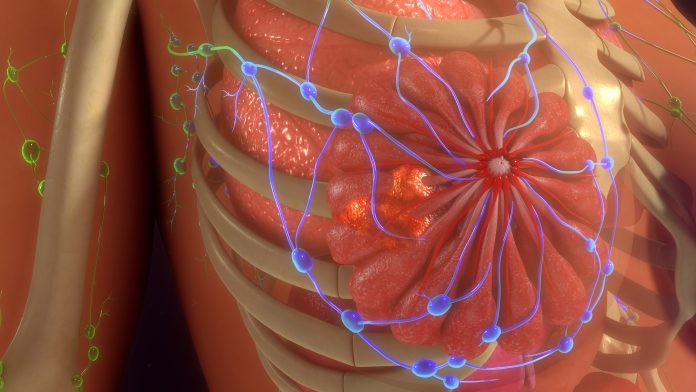
The protein GIT1 appears to protect against breast tumor growth and can be linked to a better prognosis in breast cancer patients, according to findings from researchers at Karolinska Institute in Sweden. Their study results, published this week in Nature Communications, may contribute to development of new therapies for difficult-to-treat forms of breast cancer.
Their studies of tumor cells from breast cancer patients showed that high levels of GIT1 inhibited Notch signaling and protected against tumor growth, while low levels of GIT1 enhanced tumor growth. ER-negative breast tumors from patients had lower levels of GIT1 than ER-positive breast tumors. The results also showed that ER-negative breast cancer patients with high levels of GIT1 have a better prognosis than those with low levels.
Breast cancer affects about 10 per cent of women during their lifetime. Fewer treatment options are available for ER-negative breast cancers, which lack estrogen receptors (ER) and thus do not respond to hormone therapy. Particularly difficult to treat are so-called triple-negative breast cancers, which lack not only ER but also the progesterone receptor and HER2 receptor.
“Identification of new molecular mechanisms that regulate the growth of ER-negative breast cancer is warranted, as these mechanisms may represent novel therapeutic targets”, says Per Uhlén, professor at the Department of Medical Biochemistry and Biophysics, Karolinska Institutet.
Hormonal (anti-estrogen) therapies are relatively effective for ER(+) tumors. However, fewer treatment options are available for ER(−) breast cancer, particularly for triple-negative breast cancers (TNBCs), which are negative not only for ER but also for the progesterone receptor and HER2 receptor.
As a result, scientists have been looking for molecular mechanisms associated with ER(−). Notch signaling has emerged as one of the possible targets. The link between hyperactivated Notch signaling and poor prognosis is well established for breast cancer, particularly for ER(−) forms. Crosstalk between estrogen signaling and Notch signaling has been reported, and Notch downstream signaling is higher in ER(−) breast cancers than in ER(+) breast cancers, in which estradiol inhibits Notch signaling.
Professor Uhlén and colleagues have identified a novel mechanism by which the ubiquitous protein GIT1 regulates Notch signaling, affecting the initiation and growth of ER-negative breast cancer.
Notch signaling is an evolutionarily conserved cell-cell communication mechanism that has been shown to regulate cell fate decisions in most organs of the body and at different steps during cell development. Overactive Notch signaling in breast cancer patients has previously been linked to a worse prognosis.
“Our results provide important information about a mechanism that controls the initiation and growth of breast tumors,” says Professor Uhlén. “We hope that these findings will inform the development of new therapies for patients with difficult-to-treat breast cancer.”
His research group is actively collaborating with clinicians treating patients with cancer to focus on research topics that are crucial for the treatment of patients.
“We want to conduct research that can benefit patients with severe diseases,” says Professor Uhlén. “At Karolinska Institutet, we have state-of-the-art tools and equipment that can push the development of new therapies.”













